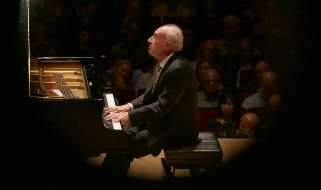|
Back
An Italian Master As Fresh As Snow New York
Carnegie Hall
10/25/2015 -
Ludwig van Beethoven: Piano Sonatas No. 17 in D minor, op. 31. no. 2, "The Tempest", No. 23 in F Minor, op. 57, "Appassionata" & No. 24 in F-sharp Major, op. 78
Arnold Schoenberg: Three Piano Pieces, op. 11 – Six Little Piano Pieces, op. 19
Maurizio Pollini (piano)

M. Pollini (© Carnegie Hall)
The name Maurizio Pollini conjures up delights of classical music past. Now 73 and having won the International Chopin Piano Competition as long ago as 1960, he has figured among the world’s leading pianists for longer than much of his Carnegie Hall audience this Sunday afternoon has been alive. Once boasting communist and other radical political connections, Pollini belongs more decisively to the world of the cold war than to the modern age, whatever it is.
None of this was in evidence as he played through an intriguingly linked program of Beethoven sonatas and short Schoenberg pieces, however. The pairing may not seem obvious, but both composers strived – in their own ways and along the same spectrum of musical history – for economy of expression. Beethoven’s sonatas are nearly symphonic in length but capture a cascading range of emotions. Schoenberg’s shorter pieces – the individual ones among his Six Little Piano Pieces last scarcely more than a minute each – eliminate the cascade of evocative notes to capture feeling in geometric patterns of atonality.
Pollini’s long practiced talent deployed to gorgeous effect in both styles. His Beethoven playing exemplified the intense and lasting dexterity of the child prodigy he so long ago was. The famous "Appassionata" (so named by a music publisher ten years after the composer’s death) radiated the warmth of a lifetime of careful contemplation. In the Schoenberg selections, Pollini’s instrument seized the verticals of composition with tact as much as with verve. Some critics have sniffed that Pollini is slowing down, waning in emotive power. But to make such a complaint is to lose sight of the wisdom that decades of experience have brought to his playing, which remains a technical as well as an emotional marvel.
Along with his first Carnegie concert two weeks ago, New York should hope that such a fine pianist returns season after season for as long as he is able.
Paul du Quenoy
|